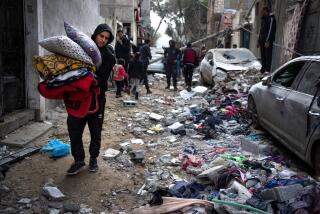The Costs Are Worth It to Curb the Terror
- Share via
Col. Moammar Kadafi and the United States’ strange little war with him make wonderful television and newspaper stories. Now the U.S. air strike against terrorists and military bases in Libya has raised a number of fundamental foreign-policy issues in our quarrel with Kadafi.
Should the United States oppose him? Will this attack aid the battle against terrorism? Are massive applications of unilateral military force effective in this case? Do the gains against Kadafi justify straining relations with our allies? And what effect will this action have on U.S.-Soviet relations--particularly nuclear-arms control?
If not Kadafi, then who? He has attacked neighboring friendly governments, notably Tunisia and Egypt; caused the murder of Jews, Israelis, Libyans, Americans, West Europeans, Arabs and Africans; subsidized the most ruthless terrorists in the Middle East and Western Europe; made common cause with the Soviet Union, and turned his country into an arsenal of Soviet military hardware.
Will attacks against Kadafi hurt the terrorists? Terrorists are weak, not strong. They possess no mystical powers. They are hard to destroy because they enjoy the protection of sovereign governments. Libya and Syria are among the worst offenders. Military strikes, economic sanctions and diplomatic isolation are all appropriate exercises of power and influence against Libya.
Terrorists are free to operate out of Tripoli and Lebanon’s Bekaa Valley because they serve the foreign-policy interests of Libya and Syria. Terrorists have no addresses, but governments do. When the risks become too high, Libya and Syria will stop the terrorist acts that emanate from their territories.
In war and politics, leaders rarely, if ever, know the luxury of being able to choose the best possible way to do anything. But they are able to choose the best course of action under the circumstances. The obligation of statesmen is to make it possible to do what common sense and decency counsel ought to be done.
The United States has applied more than unilateral military action against Kadafi and the terrorists. The Administration made sure that the fighting in the Gulf of Sidra was preceded and accompanied by a sustained and systematic campaign of diplomatic and economic measures designed to isolate and hinder terrorism and win the support of the United States’ allies.
The United States has obtained the support of the British government against Kadafi. The governments of Western Europe have spoken out against him as well. Certainly the United States would prefer to have the full cooperation of West Germany, France, Italy and Egypt, but these nations eventually will come to support our position. Several European governments have just seen the collapse of shortsighted attempts to make deals with terrorists that protect their own citizens at the expense of others. They will not make the same mistake again.
To Egypt and other governments friendly to both the United States and the Middle East, it is essential to uphold the principle of non-intervention in Arab lands. This cause is distinct from Kadafi, his agenda and international terrorism. The principle of non-intervention commands the support of all Arab governments. Kadafi and his terrorists do not.
As for the Soviet reaction, by canceling the pre-summit meeting between Secretary of State George P. Shultz and Foreign Minister Eduard A. Shevardnadze, the Soviets have imposed a cost on the United States and hit the most sensitive nerve in Western Europe. Above all, Europeans fear a worsening of U.S.-Soviet relations, which would lessen security on the continent that they must share with the other superpower.
At the same time, the Soviets have been distinctly cool toward Kadafi: They condemned the U.S. action, but they have not moved to defend him. More likely, the Soviets will continue military and technical assistance to Libya and position themselves to influence the choice of Kadafi’s successor.
These are real costs, but they are worth it to force Kadafi to restrain terrorism.
More to Read
Sign up for Essential California
The most important California stories and recommendations in your inbox every morning.
You may occasionally receive promotional content from the Los Angeles Times.













